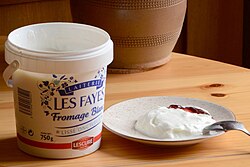Fromage frais

Fromage blanc and its container, served on a plate with jam
|
|
| Alternative names | maquée, fromage frais |
|---|---|
| Place of origin | France |
| Main ingredients | whole or skimmed milk, cream |
| |
|
Fromage blanc (UK /ˌfrɒmɑːʒ ˈblɒ̃/;French pronunciation: [fʁɔmaʒ blɑ̃]; also known as maquée) is a fresh cheese originating from the north of France and the south of Belgium. The name means "white cheese" in French. Fromage frais ("fresh cheese") differs from fromage blanc in that, according to French legislation:
The denomination fromage frais is reserved for unripened cheese that underwent a mostly lactic fermentation. Fermented white cheese marketed under the terms "fresh" or "fresh cheese" must contain live flora at the time of sale to the consumer.
So, fromage frais must contain live cultures when sold, whereas with fromage blanc, fermentation has been halted.
Fromage blanc is a creamy soft cheese made with whole or skimmed milk and cream. It is similar to some kinds of quark. It has the consistency of cream cheese, but less fat. Pure fromage blanc is virtually fat free, but cream is frequently added to improve the flavour, which also increases the fat content, frequently to as high as 8% of total weight.
Fromage blanc can be served either as a dessert similar to yogurt, frequently with added fruit, put on bread, usually over or under jam, or used in savoury dishes. In many Western countries, fromage blanc is sold in supermarkets alongside yogurts.
...
Wikipedia
